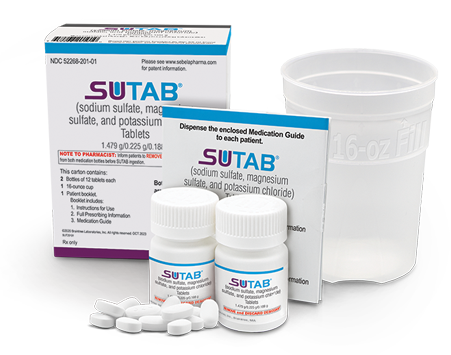What to Expect

Meet Ian, a Real SUTAB Tablet User

What to Expect During Your Colonoscopy
- During a colonoscopy, your doctor will very carefully put a thin, flexible tube with a lighted fiber optic camera, called a colonoscope, into your rectum and colon. The colonoscope sends pictures of the inside of your colon to a video screen so your doctor can check for polyps (abnormal growths) or colon cancer. If your doctor does see a polyp, it can be removed during your colonoscopy.
- You will have an IV placed in a vein in your hand or arm so you can be given medicines and fluids. Right before the test begins, your doctor will give you a mild sedative to help make you as comfortable as possible. As you lie on your side, your doctor will slowly and gently put the colonoscope into your rectum and up through your colon. You may feel some pressure, bloating, or cramping during the test.
- After your test, you will have to rest for a while until the effects of the medicine wear off. While you are resting, your doctor will talk to you about the results of your test and whether any polyps were removed. If a biopsy was performed you can expect to get the results in a few days.
- Do not drive yourself home after your test. Ask a loved one or friend to go with you on the day of your exam.
What to Expect With SUTAB
Be sure to follow your doctor’s instructions and carefully read the information that comes with SUTAB. Your doctor will tell you when it is time to begin taking SUTAB.
SUTAB is a split-dose (2-day) regimen. A total of 24 tablets is required for complete preparation for colonoscopy. You will take the tablets in two doses of 12 tablets each. Water must be consumed with each dose of SUTAB, and additional water must be consumed after each dose.
In clinical studies, the most common gastrointestinal adverse reactions are nausea, abdominal distension, vomiting and upper abdominal pain. Call your doctor if you have any questions about taking SUTAB.

Packaging and tablets not shown actual size.
INDICATION
SUTAB® (sodium sulfate, magnesium sulfate, potassium chloride) tablets for oral use is an osmotic laxative indicated for cleansing of the colon in preparation for colonoscopy in adults.
CONTRAINDICATIONS
Use is contraindicated in the following conditions: gastrointestinal obstruction or ileus, bowel perforation, toxic colitis or toxic megacolon, gastric retention, hypersensitivity to any ingredient in SUTAB.
DOSAGE AND ADMINISTRATION
A low residue breakfast may be consumed. After breakfast, only clear liquids may be consumed until after the colonoscopy. Administration of two doses of SUTAB (24 tablets) are required for a complete preparation for colonoscopy. Twelve (12) tablets are equivalent to one dose. Each SUTAB bottle contains a desiccant. Remove and discard the desiccant from both bottles the evening prior to the colonoscopy. Water must be consumed with each dose of SUTAB and additional water must be consumed after each dose. Complete all SUTAB tablets and required water at least 2 hours before colonoscopy.
WARNINGS AND PRECAUTIONS
Risk of fluid and electrolyte abnormalities: Encourage adequate hydration, assess concurrent medications and consider laboratory assessments prior to and after each use; Cardiac arrhythmias: Consider pre-dose and post-colonoscopy ECGs in patients at increased risk; Seizures: Use caution in patients with a history of seizures and patients at increased risk of seizures, including medications that lower the seizure threshold; Patients with renal impairment or taking concomitant medications that affect renal function: Use caution, ensure adequate hydration and consider laboratory testing; Colonic mucosal ulcerations: Consider potential for mucosal ulcerations when interpreting colonoscopy findings in patients with known or suspected inflammatory bowel disease. Suspected GI obstruction or perforation: Rule out the diagnosis before administration. Hypersensitivity reactions, including anaphylaxis: Inform patients to seek immediate medical care if symptoms occur. Risk of Gastrointestinal Complications with Ingestion of Desiccant: Postmarketing reports of ingestion of the desiccant along with SUTAB tablets has been reported and may be associated with risk of gastrointestinal complications and/or choking.
ADVERSE REACTIONS
Most common gastrointestinal adverse reactions are: nausea, abdominal distension, vomiting, and upper abdominal pain.
DRUG INTERACTIONS
Drugs that increase risk of fluid and electrolyte imbalance.
View the Full Prescribing Information and Medication Guide.
References: 1. IQVIA, National Prescription Audit Report. December 2023. 2.Di Palma JA, Bhandari R, Cleveland M, et al. A safety and efficacy comparison of a new sulfate-based tablet bowel preparation versus a PEG and ascorbate comparator in adult subjects undergoing colonoscopy. Am J Gastroenterol. 2021;116(2):319-328. doi: 10.14309/ajg.0000000000001020. 3. SUTAB® [package Insert]. Braintree, MA: Braintree Laboratories, Inc. 4. Rex DK, Johnson DA, Anderson JC, Schoenfeld PS, Burke CA, Inadomi JM; American College of Gastroenterology. American College of Gastroenterology guidelines for colorectal cancer screening 2009 (corrected). Am J Gastroenterol. 2009;104(3):739-750.
SUFLAVE™ (polyethylene glycol 3350, sodium sulfate, potassium chloride, magnesium sulfate, and sodium chloride for oral solution) is an osmotic laxative indicated for cleansing of the colon in preparation for colonoscopy in adults.
DOSAGE AND ADMINISTRATIONA low residue breakfast may be consumed on the day before colonoscopy, followed by clear liquids up to 2 hours prior to colonoscopy. Administration of two doses of SUFLAVE are required for a complete preparation for colonoscopy. Each bottle must be reconstituted with water before ingestion. Each bottle and one flavor enhancing packet are equivalent to one dose. An additional 16 ounces of water must be consumed after each dose. Stop consumption of all fluids at least 2 hours before the colonoscopy.
CONTRAINDICATIONSUse is contraindicated in the following conditions: gastrointestinal obstruction or ileus, bowel perforation, toxic colitis or toxic megacolon, gastric retention, hypersensitivity to any ingredient in SUFLAVE.
WARNINGS AND PRECAUTIONS
Risk of fluid and electrolyte abnormalities: Encourage adequate hydration,
assess concurrent medications and consider laboratory assessments prior to and after each use; Cardiac arrhythmias: Consider pre-dose and
Most common adverse reactions (≥2%) are: nausea, abdominal distension, vomiting, abdominal pain, and headache.
DRUG INTERACTIONSDrugs that increase risk of fluid and electrolyte imbalance.
